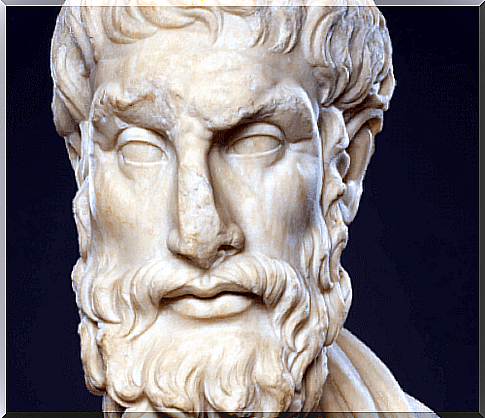Epicurus And The Theory Of Pleasure

The life of human beings is governed by numerous principles, and there are many authors who have dedicated themselves to their study throughout history. Epicurus is among them. Through philosophy, he has explored the wonderful aspects of human nature leading us to a better understanding of it.
His great passion for knowledge led him to found a school and his contribution is so important that it is still an object of study today.
In this article we will deepen the thought of Epicurus: we will talk about his life, his ideas and the importance of his legacy. Let’s dive into the philosophy of this fabulous author!

Life of Epicurus
Epicurus was born on the island of Samos, Greece, in 341 BC. The mother Cherestrata was a fortune teller and the father Neocles a teacher. The family belonged to the wealthy social class.
Epicurus spent his childhood and part of his adolescence in Samos with his family, later taking refuge in Colofone after his expulsion from the island. At the age of 14, he moved to Theos, where he remained for three years. There he received the teachings of Nausifane, a disciple of Democritus; and it was in these years that his interest in philosophy was born.
At the age of eighteen, Epicurus went to Athens to carry out the two years of military service required to obtain citizenship. There, he may have come into contact with the ideas of Xenocrates, the successor of Plato’s thought, and of Aristotle, who was in Athens at the same time.
From Athens onwards
There is no trace of the next ten years ; the most accredited hypotheses suggest that he devoted himself to travel and studies. In fact, it is likely that in those years he developed his philosophical vision starting from the comparison with the Platonic and Aristotelian thinkers.
From a letter written to Theos and preserved by Diogenes, it is known that at the age of 32 he devoted himself to teaching; first in Mytilene and then in Lampsaco. Over time, Epicurus had several disciples, who helped him develop his school.
The school, founded in 306 BC, was called “the garden”. It became famous for involving women and cultivating friendship. At the time, the most important academies were those of Plato and Aristotle.
Epicurus died of prostatitis at the age of 72. He dedicated an affectionate letter to the friends of Lampsaco, in which he refers to serenity even in pain as an act of fidelity to his philosophy.
The legacy of Epicurus
Epicurus’ legacy consists of over 300 manuscripts. Diogenes Laertius described him as a prolific writer, and kept three of his letters and the Kýriai dòxai (“Maximum capitals”). Let’s see in more detail:
- Letter to Herodotus. In which he talks about physics and gnoseology.
- The one written in Pitocles, focused on meteorology, but which also speaks of cosmology and astronomy.
- Letter to Meneceo, in which he speaks of ethics and theology.
- Kyriai. These are the main doctrines of Epicurus, also known as “Maxims Capitals”. They consist of forty short aphoristic statements. They contain ethical concepts central to the Epicurean school of philosophy.
According to Diogenes Laertius, among the main works of the philosopher, in addition to those mentioned, there are also those that have as their theme nature, justice and other virtues, physics and the Tetrafarmaco.
The thought of Epicurus
Epicurean philosophy was opposed to Platonic and Aristotelian philosophy. Everything revolves around an idea: there is nothing beyond reality and the sensible world; thus denying the concept of immortality of the soul.
Epicurus argued that the soul, like the rest of the elements, was composed of atoms. In fact, Epicurean philosophy can be divided into three branches:
- Canonical philosophy, through which he examined the way we know. According to Epicurus, the basis of knowledge is sensation; which occurs when images reach the senses. Furthermore, for the philosopher, experience is the only thing one can rely on to obtain information from the outside world.
- Physics. Epicurus believed that reality was made up of atoms and emptiness. And, although influenced by Democritus, he also introduced the element of chance into the movement of atoms. In fact, in the letter to Herodotus, he theorized that nothing can arise from what does not exist.
- Ethical philosophy. It is perhaps for it that Epicurus is primarily known. He argued that philosophy had the purpose of leading to happiness those who were immersed in it, as long as it was founded on: autonomy, autarky and ataraxia. Furthermore, he associated pleasures with calm and peace, referring to them as a source of happiness.
Other important contributions of Epicurus
Epicurus also spoke of fear; he believed, for example, that the fear of the gods was something absurd: they should rather represent a model of virtue, without interfering in human affairs.
Likewise, he considered the fear of death to be equally irrational and based on two aspects: the thought of something horrible after death, and the feeling of no longer existing.
The fear of pain was also unfounded for him. According to his reflection, if the pain is mild it can be easily overcome; if, on the other hand, it is intense, then its duration may be short.
As for the fear of failure, he believed that its origin was to ignore the fact that happiness depends on internal factors.
The pursuit of pleasure
One of Epicurus’ most important contributions was his reflection on the pursuit of pleasure. He found it necessary to distinguish between natural and necessary desires, such as satisfying hunger or thirst; and natural and unnecessary ones, such as gluttony; or even those neither necessary nor natural, such as, for example, the pleasure of honor.
He came to the conclusion that it is possible to achieve happiness in only one way, namely through pleasure; taking into account what is really indispensable, autonomy and other internal factors. In addition to cultivating friendship. To do this, it is necessary to put aside irrational fears, and to anchor oneself in reality through experience.
Finally, Epicurus highlighted the value of friendship. For him, generosity was one of the most important virtues. His philosophy was a defense of the pleasure of being alive and of autonomy. To conclude, we give him the floor:









